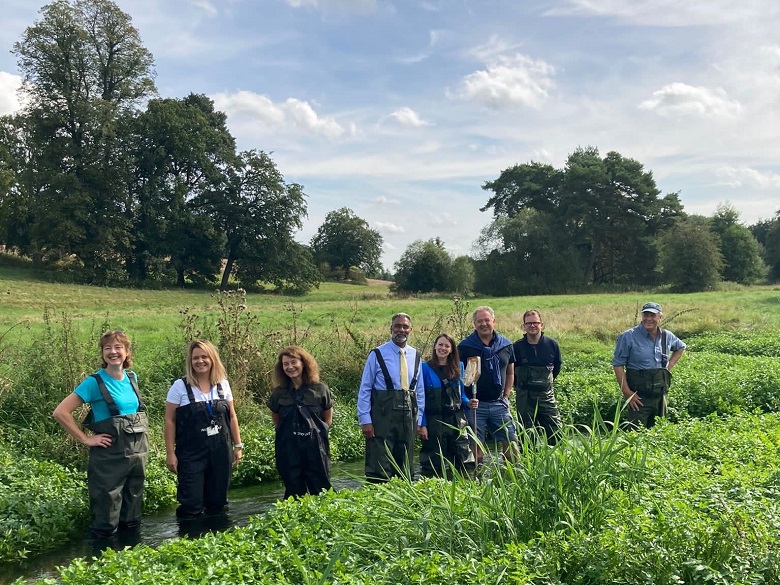Thames Water announces ‘smarter’ plans to improve and protect the River Chess
Monday 20th September 2021 12:15

Thames Water has launched its plans to protect and enhance the River Chess, while involving local communities in its care.
On Friday (September 17), local councillors and community leaders joined Thames Water at the official launch event in Latimer Park, Chesham.
Guests saw first-hand water quality monitoring of the chalk stream and preservation efforts by the Chilterns Conservation Board, Chilterns Chalk Streams Project and River Chess Association, who have worked with the water company on its Smarter Water Catchment initiative for the river.
The £3 million project aims to bring together organisations, community groups and residents from across the region to help secure a brighter future for the River Chess and other rivers in the area.
The plans set out a 10-year commitment to boost biodiversity and help address water quality issues, as well as providing wider benefits for local communities through better access, improved amenities, schools programmes, volunteering opportunities and health and wellbeing benefits.
Richard Aylard, Thames Water sustainability director, said: “We are keen to play our full part in protecting and enhancing this precious resource. Working in partnership with local stakeholders we’ve set out our plans to protect the Chess’s vulnerable and ecologically significant chalk stream environment, by reducing abstraction and improving water quality through a major expansion of our Chesham sewage works.
“We’re looking forward to working with local partners to improve access and engage as many local people as possible in this wonderful chalk stream and the wildlife on their doorstep. Our smarter water catchments are all about Thames Water collaborating with the people who know and love their local rivers the most, for the benefit of future generations.”
Paul Jennings from the River Chess Association said: “It is great to be working on a project that is looking at The River Chess Catchment as a whole. Fundamental issues surrounding water volume and quality are being addressed and work is well underway with cooperation from Thames Water and Affinity Water. Working with local authorities and the farming community we will be addressing urban and arable runoff. In addition, we will be working with community groups to provide greater access to the river and educate the next generation of river enthusiasts.”
Tom Beeston, Chiltern Society Chief Officer, said: “We’re delighted to be part of this long-term project helping to protect and restore the River Chess. To achieve this, we need a new approach not just to abstraction and pollution discharges, but also to how we manage housing and development, public access and putting nature first. We’re excited with this new open approach and know we need everyone’s support in the community to achieve the ambitious targets set, not just the water companies, but also the public and all levels of government.”
Councillor Simon Diggins for Sarratt Parish Council said: “As a local councillor and resident, I am delighted to see the Chess Valley SWC Project get off the ground. We are privileged to live in, and around, a beautiful and very special landscape but it is fragile and faces a number of challenges. The answer to one part of the problem, may create another issue downstream. Pleasingly, the project recognises this and there is a strong emphasis on multiple stakeholder engagement, to garner a wide variety of views, and education and outreach, to build a consensus around changes and improvements.”
Anna Jarmolinska-Nowak, corporate responsibility manager at Affinity Water said: "We are delighted to be working together with Thames Water, local community and charities who champion the River Chess, and support catchment plans to bring the river back to better health. We have already made significant steps last year in the summer of 2020 towards this goal, and closed two pumping stations that abstracted water in the upper Chess. All are committed to protecting and enhancing the precious chalk stream habitats that are highly valued by local communities and a quintessential part of the English landscape. Joining us all up on the Smarter Catchment Project we can achieve more and bring the improvements quicker, focusing on engagement and water use, water quality, flow management and biodiversity improvements."
Chalk streams are a globally rare habitats, with 85 per cent of the world’s 260 chalk streams located in England. Nine of these are found in the Chiltern Hills.
Working in partnership with local stakeholders, Thames Water will tackle the issues of water quality and low water levels, which affect the River Chess, and support the health and wellbeing of Chess communities by:
- Carrying out improvements to Chesham Sewage Treatment Works to reduce discharges. Thames Water sees all discharges of untreated sewage as unacceptable, and the Chesham upgrade will accelerate work to stop them being necessary.
- Identifying sustainable solutions to river flow issues by working with groups such as Water Resources South East (WSRE) and Affinity Water who supply the area.
- Closing its water pumping station for the area in 2025, to reduce abstraction pressures.
- Re-lining over 10km of its sewer network in hotspot areas to prevent the infiltration of water.
- Improving opportunities for access by all user groups to the river and the wider valley landscape.
- Creating programmes of education for local schools, colleges and special-interest groups while expanding its network of volunteers to involve a broader cross-section of the local community in practical conservation.
The full set of initiatives for the River Chess can be found on the Thames Water website. The company has also launched plans for the River Evenlode and the River Crane. The three plans were co-created in partnership with 67 organisations who have an interest in these rivers. Thames Water will be looking at expanding this approach to other catchments from 2025 onwards.
